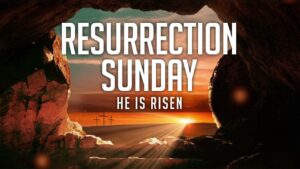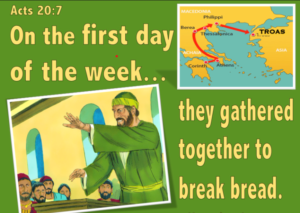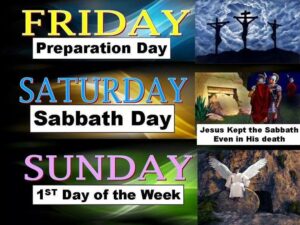THE MEANING OF SUNDAY – Sunday is Lord’s Day not Sabbath Day

The New Testament makes explicitly clear that the first day of the week, or Sunday, was a holy day for the primitive Christians, even before Nicaea Synod (325). The Holy Eucharist, the central act of Christian worship, is celebrated on Sunday, otherwise known as ‘the First Day‘ (Matt. 28:1; mk. 16: 2, 9; Lk. 24: 1; Jn. 20:1, 19; Acts 20: 7; 1 Cor. 16: 2), ‘the Lord’s Day‘ (Rev. 10: 1); ‘the Eighth Day‘ (Jn. 20: 26); and as ‘Resurrection Day‘. Each time a liturgy is celebrated is a Sunday or Lord’s’ Day, the Day after the Sabbath. Thus Sunday has more emphasis and importance.
This day is called Sunday especially, because on that Day, the Son of God defeated the Devil by His Resurrection, conquered sin and death. That marked a new beginning, a new creation. There are evidences that as early as in AD 54, Sunday was earmarked as the day of worship. Early Church considered Sunday as the Day related to Christ.
There is a Jewish influence in Christianity, however the Christian Church do not observe the seventh day or Sabbath Day, which the LORD had blessed and sanctified (Gen. 2: 3, Ex. 16: 23 –29; 31: 1-17). In Christian Church, most important days of liturgy calendar are Sundays as Resurrection Day. Christian calendar was centred on these two days – Observance of Sunday in Christian Church: First day of the week, as Sunday more important because Jesus resurrected on Sunday. Risen Christ revealed himself to His disciples on Sunday (Jn 20: 19, 26). So, the day after the Sabbath, is called Sunday especially, because on that Day, the Son of God defeated the Devil by His Resurrection, conquered sin and death.
Our Lord chose to appear to His Disciples on Sundays. Day of Christ’s Appearances to His Disciples was on First Day of the week (Sunday).
Jesus appear to Mary Magdalene on first Day of the week (Mk. 16:9-11; Jn. 20: 11-18).
To the other women, Mary & Salome on first Day of the week (Matt. 28: 9-10).
To Simon Peter (Lk: 24.34 ) on first Day of the week,
To the two disciples on the way to Emmaus (Lk 24: 1, 13-35) on first Day of the week ,
On the first Day of the week (Sunday of Resurrection) to the apostles (Lk 24: 36–49, Jn 20.19-23)
On the Sunday following the Day of Resurrection (eighth Day), He appeared to Thomas and the other apostles (Jn 20: 26-29).
The Day of the Outpouring of the Holy Spirit on the Apostles (Pentecost Day) Acts 2 celebrated on the first day of the eighth week after Passover.
The last appearance of the Lord mentioned in the New Testament is also on a Sunday (Rev 1: 9-20) – Lord’s Day.

The days of the week in the Roman Empire, when Christianity was born into the world were dedicated to various planetary gods. They saw the desirability of a distinctively pagan way of naming the days of the week, and thus there arose dies solis (day of the Sun, – Sunday); dies lunae (day of the moon, – Monday), and so on. The word “Sunday” is pagan in origin. The right word for us is ‘kuriake‘ or the Lord’s Day, the name given to this holy day by St. John (Rev. 1:10). St John would have called Sunday as Lord’s Day because early Church started to observe each Sunday as Feast of Resurrection. In Syrian Church also, Sunday is considered as the ‘First Day’ or the ‘Day of Resurrection’ or KYMTHA.

Sunday after the Resurrection of Lord Jesus is significant. Our blessed Lord rose from the dead on the Lord’s Day, the first day of the week. Jesus and His disciples being Jews, used to worship on the Saturdays. As per the commandment of the Lord, the Jews observed the Sabbath and gathered in the Synagogue for worship (Acts 13: 14, 27, 42; 15: 21; 16: 13; 17: 2; 18: 4). The first day of the week as a special day was then unknown, to the Greeks; yet they came to together to remember their Lord on that day. The disciples later on came together to break bread on the first day of the week, Troas (Acts 20: 7-8). Here we see a shift from Sabbath Day worship to Sunday worship. But just after the Resurrection of Lord Jesus Christ on Sunday, the disciples started setting apart and observing that day as the Lord’s Day and gathered for the worship. “Now on the first day of the week, when the disciples came together to break bread, Paul, ready to depart the next day, spoke to them and continued his message until midnight.” (Acts 20: 7)
Sunday was the first day of the week according to the Jewish method of reckoning, but for Christians it began to take the place of the Jewish Sabbath in Apostolic times as the day set apart for the public and solemn worship of God. The practice of meeting together on the first day of the week for the celebration of the Eucharistic Sacrifice is indicated in Acts 20: 7; I Cor. 16: 2; Rev. 1: 10, it is called the Lord’s Day. Jesus Christ died so that sin would be drowned. When we die with Christ, we can be resurrected with Him on ‘the Lord’s Day’. Sunday, then, is the Day of the Resurrection of Christ. Each Sunday is a “Little Resurrection Day.” By partaking in the Body and Blood of Christ, i.e., His Sacrifice to the Father, we share in His Death and therefore His Resurrection. The offering for the work of the Lord was laid aside on the first day of the week 1 Cor. 16:2. There is the Lord’s Supper – I Cor. 11:20; the Lord’s Table – I Cor. 10:21; and the Lord’s Day – Rev. 1:10. At the Lord’s Table saints meet in Christian fellowship wherever they meet; once a week on the first day of the week, the Lord’s Day, they come together to partake of the Lord’s Supper.

What was so special about the first day of the week (Sunday) that the Evangelist categorically mentions this day. The first day of the week is the Lord’s Day- when our Lord rose from the dead. (Matt. 28:1; St Mk 16:1; St Lk 24:1; Jn 20:1)
We sing in our liturgical hymn thus: “Azhchayiladhyathethaai- dunnee Shudhadine- Adhyajanuyir poontezhulepi-chee manmayareyum” (On this day, first of the week, maiden and holy First-Born Son came back to life, and – raised all the dead) – Liturgical hymn from Kymtha morning prayer (Sunday)
Anyway, on the first day of the week the pagans gathered to worship the Sun and it was called by them, “the Day of the Sun.” But the Sun has a very special Christian meaning. Christ is called by the Bible “the Sun of Justice,” because as that ball of fire in the sky, Jesus is the source of Life and Light. Christianity accepted the name “Sunday” for the Day of Resurrection because it was the spiritual Life and Light given to mankind. It was on Sunday God created light.
With Christ’s Resurrection, the Sunday became the most significant among the days. For us Orthodox Christians, Saturday remains the Sabbath, the day on which the Church especially remembers the departed, as Jesus Christ rested in the tomb on Great and Holy Saturday. Thus, the Sabbath retains its significance. This is why we never fast strictly on Saturdays (except for Holy Saturday/Gospel Saturday). Even during Great Lent, when we do not celebrate Holy Eucharist on the weekdays, the Church always appoints the Divine Liturgy for both Saturday and Sunday.
There is a great difference between Sunday and the Sabbath. Sunday is a transfer of the Sabbath to the following Day. Sunday has a meaning the Sabbath could never have. On Sunday, early Christians met before dawn to receive the Sacraments. Thus, we see that the Lord’s Day or Sunday is something entirely new. It is no imitation of the Sabbath. Sunday is a Christian product, which gains importance from the celebration of the Sacraments, particularly, the Holy Eucharist.
For Christians, Sunday, the Lord’s Day, is the day of the New Creation, the day of the Resurrection, and so it supersedes Saturday as the primary day of Christian worship. The practice of observing the Divine Liturgy on the first day of the week has its origin in Apostolic times. The Didache, the oldest Christian document outside of the New Testament itself, commands us: On the Lord’s Day gather yourselves together and break bread and give thanks, first confessing your transgressions, that your sacrifice may be pure.
In the Didache (XIV) the injunction is given: “On the Lord’s Day come together and break bread. And give thanks (offer the Eucharist), after confessing your sins that your sacrifice may be pure“.
In the Epistle of Barnabas, we read: “Wherefore, also, we keep the eighth day (i. e. the first of the week) with joyfulness, the day also on which Jesus rose from the dead”.
St Ignatius of Antioch, an Apostolic father, a contemporary of the holy Apostles and a disciple of St John the Beloved Disciple, taught in one of his epistles about the importance of Lord’s Day (Sunday) thus: “If, therefore, those who were brought up in the ancient order of things have come to the possession of a new hope, no longer observing the Sabbath, but living in the observance of the Lord’s Day, on which also our life has sprung up again by Him and by His death…” (The Epistle of Ignatius to the Magnesians). St. Ignatius speaks of Christians as “no longer observing the Sabbath, but living in the observance of the Lord’s Day, on which also our Life rose again“.

So, it is clear from the aforementioned epistle of St Ignatius that for the early Christians, the first day of the week (i.e. Sunday), when Lord Jesus Christ rose from the dead, was ‘Lord’s Day’.
St. Justin is among early Christian writer to call the day Sunday which he describes the worship offered by the early Christians on that day to God. The fact that they met together and offered public worship on Sunday necessitated a certain rest from work on that day. However, Tertullian (202) is the first writer who expressly mentions the Sunday rest: “We, however (just as tradition has taught us), on the day of the Lord’s Resurrection ought to guard not only against kneeling, but every posture and office of solicitude, deferring even our businesses lest we give any place to the devil”
St Justin Martyr gives the pertinent answer, for it is the Lord’s Day, the day of the Resurrection (not a pagan worship dedicated to sun god, as many claim today! He explains: But Sunday (Son) is the day on which we all hold our common assembly, because it is the first day on which God, having wrought a change in the darkness and matter, made the world; and Jesus Christ our Saviour on the same day rose from the dead.”
So, it is evident from the above that the Eucharistic worship of Sunday was the ‘norm for all Christians’ in around 100 AD! St Justin Martyr isn’t proposing an innovative a new form of worship but just sharing what the basic Christian practices were in his time! St. Gregorios of Nazianzus: “Sabbath indicates resting inside a tomb; but our Sunday is commencement of new creation. Sunday also is a symbol of the common resurrection that happens with the second coming of Christ. Man rises from the tomb of sin and worships Christ seeing him every Sunday. The foretaste of our final resurrection is experienced through our worship on Sunday and hence we do not kneel down on Sundays.
In A.D. 321, it was Emperor Constantine who decreed that the seven-day week was the official Roman week and made ‘Sunday’ a public holiday. He introduced the first civil legislation concerning Sunday in AD 321 and commanded that all work should cease on that day, Sunday, except that farmers could work, if necessary. Besides ‘Sunday’ as a holiday, the Romans also wanted ‘Saturday’ to be considered as either half-day, if not full-day holiday, as Saturday was the ‘Sabbath’ among the Jews and the only day named after a Roman God – Saturn. In support of this historical belief, most employers in the modern world, consider giving their employees either a half-day or a full-day-holiday on a Saturday.
For centuries the whole Church, the “pillar and the ground of truth,” has observed Sunday as the Lord’s Day, the holy day. Let Sunday be quite different, it is the day of the week when the Church celebrates Christ’s Resurrection. It is the weekly Resurrection Day!
For centuries the whole Church, the “pillar and the ground of truth,” has observed Sunday as the Lord’s Day, the holy day. Let Sunday be quite different, it is the day of the week when the Church celebrates Christ’s Resurrection, weekly Resurrection Day! This day will end with the final or Second Coming of the Lord in Majesty and Glory, presumably, also on a Sunday. The Lord’s day reminds us that the glorious day of the Lord is coming and, through the Eucharistic celebration, brings us into the Messianic Banquet of the Kingdom.
0 Comments